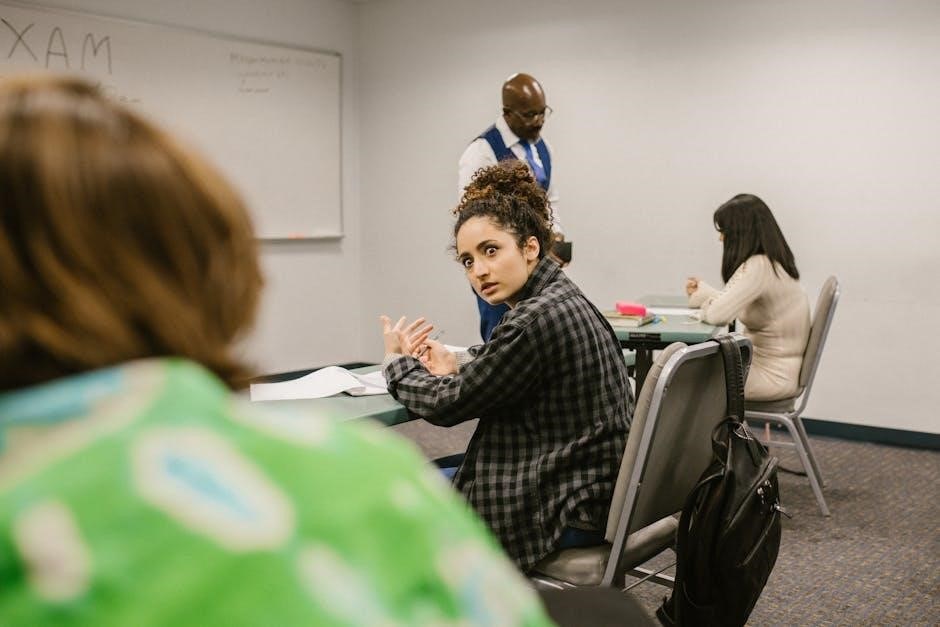William H. Pryor Jr. is a prominent figure in American law, known for his conservative judicial philosophy and originalist approach. His writings on international law, particularly its role in constitutional interpretation, have sparked significant debate. Pryor’s skepticism toward foreign legal influences and his emphasis on domestic legal traditions highlight his unique perspective on global legal issues. His work as a judge, educator, and author has solidified his influence in shaping legal discourse.
1.1 Who is William H. Pryor Jr.?
William H. Pryor Jr. is a distinguished American jurist and legal scholar, currently serving as the Chief Circuit Judge on the U.S. Court of Appeals for the Eleventh Circuit. Known for his conservative judicial philosophy, Pryor has been a prominent voice in legal discourse, particularly on issues related to originalism and the role of international law in domestic constitutional interpretation. A magna cum laude graduate of Tulane Law School, Pryor has held significant roles in public service, including Attorney General of Alabama and a member of the U.S. Sentencing Commission. He has also contributed to legal education as a visiting professor at the University of Alabama School of Law and an adjunct professor at Cumberland School of Law. Pryor’s work and writings reflect his deep commitment to upholding traditional legal principles and his skepticism toward external influences on U.S. law.

Academic Background
William H. Pryor Jr. earned his law degree magna cum laude from Tulane Law School, laying the foundation for his academic and professional achievements in law and education.
2.1 Education at Tulane Law School
William H. Pryor Jr. attended Tulane Law School, where he graduated magna cum laude, demonstrating his intellectual prowess and dedication to legal studies. During his time at Tulane, he developed a strong foundation in constitutional law and legal theory, which would later shape his judicial philosophy. His academic achievements at Tulane foreshadowed his future success in the legal profession and academia; Pryor’s education at Tulane Law School was instrumental in shaping his originalist views, which emphasize the importance of interpreting legal texts based on their original meaning. This approach would become a hallmark of his judicial career and academic writings, particularly in his discussions on international law and its role in domestic legal frameworks.
2.2 Clerkship and Private Practice
Following his graduation from Tulane Law School, William H. Pryor Jr. clerked for Judge John Minor Wisdom on the U.S. Court of Appeals for the Fifth Circuit. This experience provided him with a deep understanding of appellate law and judicial decision-making. After his clerkship, Pryor entered private practice in Alabama, where he gained hands-on experience in litigation and advocacy. His time in private practice allowed him to refine his analytical and legal skills, preparing him for future roles in public service and academia. Pryor’s early career laid the groundwork for his commitment to conservative legal principles and his eventual rise as a prominent figure in American jurisprudence. These formative experiences shaped his approach to law, emphasizing precision, integrity, and a deep respect for legal tradition.

Career in Public Service
William H. Pryor Jr. served as Alabama’s Attorney General from 1997 to 2004, championing conservative principles and sparking debate with his stances on social issues.
3.1 Attorney General of Alabama
William H. Pryor Jr. served as the Attorney General of Alabama from 1997 to 2004, advocating for conservative legal principles and state sovereignty. His tenure was marked by significant legal battles, including challenges to abortion rights and same-sex marriage. Pryor’s leadership drew both admiration and criticism, as he became a vocal advocate for traditional values. His role as Attorney General provided him with a platform to influence policy and shape legal discourse in Alabama. This period solidified his reputation as a staunch conservative and set the stage for his future judicial career. Pryor’s time in public service reflected his commitment to upholding the law and advancing his ideological beliefs.

Judicial Appointment
William H. Pryor Jr. was appointed to the Eleventh Circuit Court of Appeals by President George W. Bush in 2004, amid controversy over his conservative views.
4.1 Eleventh Circuit Court of Appeals
William H. Pryor Jr. was appointed to the U.S. Court of Appeals for the Eleventh Circuit in 2004 by President George W. Bush, despite contentious confirmation debates.
He became Chief Circuit Judge in 2013, leading the court with a strong conservative judicial philosophy, emphasizing originalism and strict constitutional interpretation.
Pryor’s decisions reflect his skepticism toward expansive legal interpretations, particularly in cases involving federal power and civil rights.
His tenure has been marked by high-profile rulings, including dissents on Voting Rights Act and Affordable Care Act cases, showcasing his adherence to originalist principles.

As a prominent jurist, Pryor has significantly influenced the Eleventh Circuit’s legal landscape, aligning with broader conservative legal movements.
His role on the court underscores his commitment to judicial modesty and limited government intervention, shaping his legacy as a steadfast originalist judge.

Notable Judicial Opinions
William H. Pryor Jr.’s decisions reflect his conservative principles, emphasizing originalism and skepticism toward expansive legal interpretations, notably in cases involving the Voting Rights Act and the Affordable Care Act.
5.1 Key Cases and Decisions
William H. Pryor Jr. has authored or participated in several notable cases that reflect his judicial philosophy and approach to international law. In a significant Voting Rights Act case, his dissent highlighted skepticism about the Act’s continued relevance, aligning with his originalist views. Another key decision involved the Affordable Care Act, where he argued against the constitutionality of the individual mandate, emphasizing limited federal authority. Pryor’s rulings consistently demonstrate a strict constructionist approach, particularly in cases involving civil rights and federal power. His decisions often spark debate, showcasing his commitment to originalism and his cautious stance on international legal influences. These cases underscore his influence on legal discourse and his role as a conservative jurist on the Eleventh Circuit Court of Appeals.

Views on International Law
William H. Pryor Jr. is skeptical of international law’s role in constitutional interpretation, advocating originalism and U.S. sovereignty over foreign legal influences, prioritizing the Constitution as the primary legal authority in domestic matters.
6.1 Originalism and International Law
William H. Pryor Jr. is a staunch advocate of originalism, emphasizing the original meaning of the Constitution. He opposes using foreign or international law in domestic constitutional interpretation, arguing it distorts the Founders’ intent and undermines U.S. sovereignty. Pryor believes the Constitution should be interpreted through its historical context, rejecting external influences that could alter its original meaning. His originalist approach aligns with conservative legal thought, prioritizing the Constitution as the sole authority in American law. This philosophy has been central to his judicial decisions and scholarly writings, contributing to debates on the role of international law in U.S. jurisprudence.
6.2 International Human Rights Law
William H. Pryor Jr. approaches international human rights law with a critical perspective, influenced by his originalist judicial philosophy. He expresses skepticism about the direct application of international human rights norms in U.S. legal decisions, arguing that such influences may dilute the authority of the Constitution. Pryor believes that the U.S. legal system should prioritize domestic legal traditions over external human rights frameworks, as the latter may not align with American values or sovereignty. However, he acknowledges the relevance of human rights principles in shaping international relations and addressing global injustices. His writings reflect a cautious balance, advocating for a limited role of international human rights law in U.S. jurisprudence while recognizing its importance in broader global contexts.
6.3 International Criminal Justice
William H. Pryor Jr. has expressed nuanced views on international criminal justice, shaped by his originalist judicial philosophy and commitment to U.S. sovereignty. He has criticized the potential encroachment of international criminal law on domestic legal systems, particularly when it involves U.S. citizens or interests. Pryor argues that international criminal justice mechanisms, such as the International Criminal Court, should not supersede U.S. legal processes or undermine the nation’s ability to adjudicate its own cases. However, he acknowledges the importance of international cooperation in addressing transnational crimes, such as genocide, war crimes, and terrorism. Pryor’s approach emphasizes the need for a balanced perspective, where international criminal justice is viewed as a complementary tool rather than a replacement for national legal frameworks. His views reflect a cautious engagement with global justice initiatives while prioritizing American legal autonomy.

Role in Legal Education
William H. Pryor Jr. has significantly contributed to legal education through his teaching roles at the University of Alabama School of Law and Samford University’s Cumberland School of Law. As a visiting and adjunct professor, he has shared his expertise in constitutional law, international law, and judicial philosophy, inspiring future legal professionals. His engagement in guest lectures and seminars further underscores his commitment to fostering intellectual growth and practical understanding among students. Pryor’s teaching emphasizes originalist principles and the importance of interpreting legal texts through their original meaning, enriching the academic discourse and shaping the next generation of legal thinkers.
7.1 Teaching and Mentorship
William H. Pryor Jr. has made significant contributions to legal education through his roles as a visiting professor at the University of Alabama School of Law and an adjunct professor at Samford University’s Cumberland School of Law. His teaching focuses on constitutional law, judicial philosophy, and international legal issues, providing students with a deep understanding of originalist principles and their application. Pryor’s mentorship extends beyond the classroom, as he actively engages with students through guest lectures and seminars, fostering critical thinking and intellectual growth. His emphasis on the original meaning of legal texts and his skeptical view of foreign law in constitutional interpretation have influenced a generation of legal scholars. Pryor’s dedication to teaching and mentorship underscores his commitment to shaping the future of legal education and discourse.

Contributions to International Law Discourse
William H; Pryor Jr. has influenced international law discourse through writings like International Rule of Law, critiquing foreign legal sources in constitutional interpretation and advocating originalist principles.
8.1 Published Works
William H. Pryor Jr. has authored several significant works on international law, including a notable piece titled International Rule of Law. This work critically examines the use of foreign and international legal sources in domestic constitutional interpretation, reflecting his originalist perspective. Pryor argues that reliance on such sources risks undermining the sovereignty and legal traditions of the United States. Additionally, he contributed to the Harvard Journal of Law & Public Policy, where he explored the intersection of international law and domestic policy. His writings emphasize the importance of adhering to the original meaning of the Constitution while addressing global legal challenges. Pryor’s published works have been influential in shaping debates about the role of international law in American jurisprudence, offering a conservative viewpoint that has sparked both acclaim and criticism within legal academia.

Legacy and Impact
William H. Pryor Jr. has left a lasting influence on legal thought, particularly through his originalist interpretations and contributions to international law discourse, shaping contemporary judicial and academic perspectives.
9.1 Influence on Legal Thought
William H. Pryor Jr. has significantly influenced legal thought through his originalist interpretations and contributions to international law discourse. His skepticism toward foreign legal influences in constitutional interpretation has shaped conservative legal philosophy. Pryor’s writings, such as his work on the “International Rule of Law,” have sparked debates about the role of international law in domestic jurisprudence. His judicial decisions, particularly on the Eleventh Circuit, reflect his commitment to strict constructionism, impacting cases on criminal justice and civil rights. Pryor’s academic engagements and public lectures have further disseminated his views, inspiring a new generation of legal scholars and practitioners. His influence extends beyond the judiciary, as his ideas continue to inform discussions on sovereignty, legal traditions, and the limits of judicial authority in the globalized legal landscape.
William H. Pryor Jr.’s enduring influence on legal thought is marked by his originalist approach and skepticism toward international law, shaping both jurisprudence and legal education.
10.1 Summary and Final Thoughts
Judge William H. Pryor Jr. has left an indelible mark on American jurisprudence through his originalist philosophy and cautious approach to international law. His skepticism toward foreign legal influences underscores his commitment to domestic legal traditions, shaping significant debates. Pryor’s contributions to legal education and his role in shaping sentencing policies further highlight his enduring influence. While his views have sparked controversy, they reflect a deep dedication to conservative legal principles. As a prominent jurist and scholar, Pryor continues to inspire dialogue on the intersection of domestic and international law, leaving a lasting legacy in both judicial practice and academic discourse.




Be the first to reply